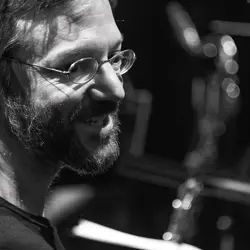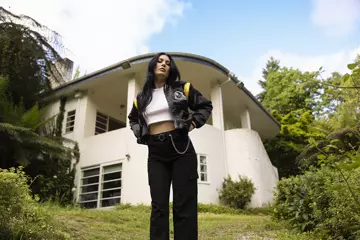 André de Ridder
André de RidderThey say you've made an impact on culture when you're in an episode of The Simpsons. That's a mark of success. In not one, not two, but three different episodes of The Simpsons (Oh Brother, Where Art Thou; Deep Space Homer; Brother Can You Spare Two Dimes) there's a homage to Stanley Kubrick's 1968 epic science fiction film, 2001: A Space Odyssey. Reactions from critics and punters alike since its release have been mixed, but it has achieved a cult status that few could argue with and many would fiercely protect.
“This film, and the way that Kubrick used the music – which has almost an operatic or balletic quality – it lends itself to be being played and screened live with an orchestra,” offers André de Ridder, the noted conductor who will lead the Sydney Symphony and Philharmonia Choirs through just such a performance for the Sydney Festival.
“Because there are such large sums of music and almost entire performances of the music without any dialogue, just with images, it is really a perfect forum for such a project,” de Ridder reasons. And judging by the success of previous performances of the project at London's Southbank Centre, he's correct.
Despite originally commissioning a score for the film by composer Alex North, in the end Kubrick set his seminal sci-fi masterpiece to the sounds of existing classical compositions; Johann Strauss II's waltz The Blue Danube (“A space ballet,” says de Ridder, wistfully), Richard Strauss' Also Sprach Zarathustra, the Requiem from the more contemporary György Ligeti.
Don't miss a beat with our FREE daily newsletter
As visually stunning as Kubrick's film remains to this day, it's not as simple as playing beautiful songs over beautiful imagery; the music must dovetail seamlessly with dialogue and special effects, and must match perfectly the visual shifts on screen.
“In a way the only difference between this project and an opera is that what comes from the film is really fixed, and in a way I need to learn the film like a score; almost frame by frame. In opera I have to look up onto the stage and see and hear what the singers are doing and also react to movement of the singers and dovetail with a gesture or an upbeat or a breath intake of theirs.
“So it is simple in that way, only that film is not part of the score, so you have to basically make or draw up another layer to the score. I had to do that for myself, to find ways of marking the score or learning it for myself so that there is another layer to be aware of, and that layer is obviously images, and the timing and the pacing and the editing of the images.”
In an interview with Cosmos, Sydney Festival director Lieven Bertels noted the crossover appeal of this unique undertaking, the potential audience a mix of film and classical music buffs who may have never before entered one another's realms of interest.
For de Ridder, it's an inspiring prospect, “It works both ways. You may get this film buff, the people who have watched 2001 twenty times in the cinema, and some of them have never heard an orchestra play live. The physical aspect of this orchestra performing the score live adds another layer to the whole thing and people will experience it in a different way.”
WHAT: 2001: A Space Odyssey with live score by Sydney Symphony and Sydney Philharmonia Choirs
WHEN & WHERE: Thursday 24 and Friday 25 January, Sydney Festival, Opera House Concert Hall















